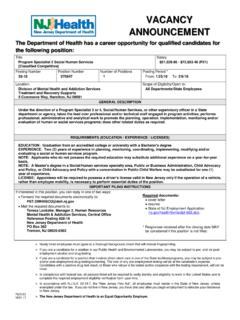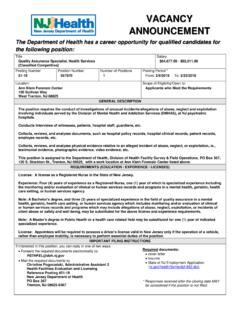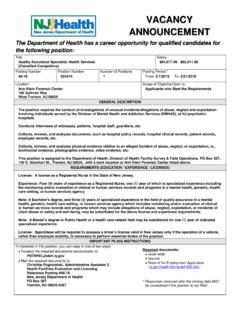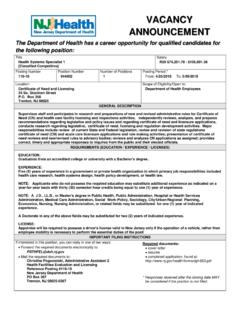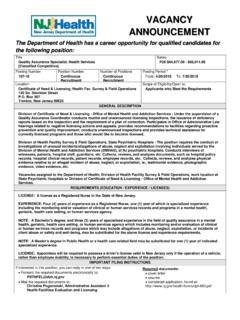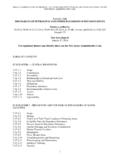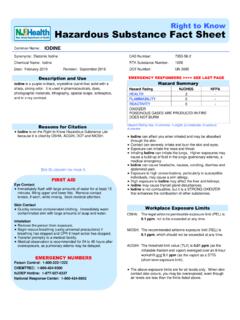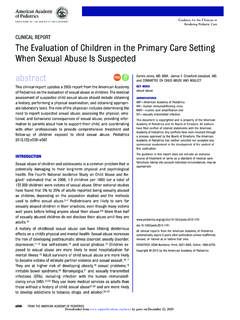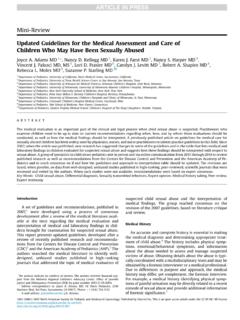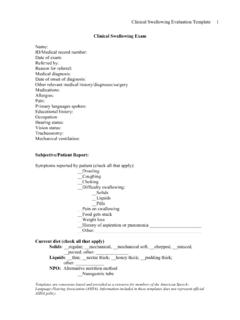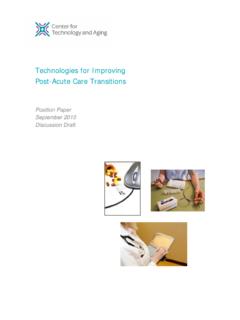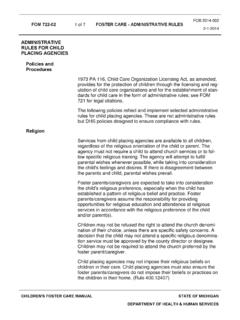Transcription of EXECUTIVE ORDER 6 REPORT - nj.gov
1 EXECUTIVE ORDER 6 REPORT . Issued by Acting Commissioner Shereef Elnahal, , March 23, 2018. TABLE OF CONTENTS. EXECUTIVE SUMMARY .. 3. Department Action Items .. 3. Regulatory Action Items .. 3. Statutory Recommendations .. 5. Additional Considerations .. 7. NEW JERSEY COMPASSIONATE USE medical MARIJUANA 9. REGULATIONS GOVERNING THE MEDICINAL MARIJUANA PROGRAM .. 9. MEDICINAL MARIJUANA PROGRAM REVIEW .. 10. An Evaluation of the Current Rules Regulating the Operations and Siting of Dispensaries and Cultivation Facilities, Particularly Focusing on Whether the Rules Should Be Revised to Remove Obstructions to Expansion .. 10. A Review of the Current Process for Obtaining a License to Operate a medical Marijuana Dispensary, Including Recommendations to Expedite That Process .. 11. An Examination of Conditions for Participating Physicians in the Program to Ensure That Any Such Requirements Are Not Needlessly Onerous.
2 12. An Analysis of the Current List of Debilitating medical Conditions for Which medical Marijuana May Be Authorized Pursuant to 24:6I-3, and a Recommendation as to Whether Doctors Should Be Given Flexibility to Make Their Determinations on their Own .. 14. An Assessment of the Methods Through Which Patients or Their Primary Caregivers Are Obtaining medical Marijuana and a Recommendation of Whether Rules Should be Amended to Approve Additional Methods That Could Facilitate Patient Access .. 16. A Review of Regulations that Govern the Forms in Which medical Marijuana Can Be Ingested, Taking into Consideration the Needs for Different Methods for Different Patients .. 18. Additional Considerations .. 19. CONCLUSION .. 21. ATTACHMENTS .. 22. EXECUTIVE Summary Matrix EXECUTIVE ORDER 6. Page 2. EXECUTIVE SUMMARY 1. Governor Murphy issued EXECUTIVE ORDER No.
3 6 (2018) (EO 6) directing the New Jersey Department of Health2 (Department) to undertake a review of all aspects of New Jersey's medical Marijuana Program (MMP), with a focus on ways to expand access to marijuana for medical purposes. These include, but are not limited to, a review of the current rules for operations and siting of dispensaries and cultivation facilities; conditions for participating physicians in the program; the current list of debilitating medical conditions for which medical marijuana may be authorized pursuant to 24:6I-3; physician flexibility to make determinations about qualifying conditions; methods by which patients and caregivers obtain product; forms for medical marijuana to be ingested, taking into consideration the needs for different methods for different patients; and other aspects of the MMP within the Department discretion that hinder or fail to effectively achieve the statutory objective of ensuring safe access to medical marijuana for all patients in need.
4 The Department of Health, after consultation with stakeholders and the Alternate Treatment Center (ATC). operators, presents the following action items and recommendations to improve and expand patient access to medicinal DEPARTMENT ACTION ITEMS. EXPANSION OF AUTHORIZED DEBILITATING medical CONDITIONS. The Commissioner concurs with the October 25, 2017 final recommendation of the Medicinal Marijuana Review Panel to grant the petitions under the categories of Chronic Pain Related to Musculoskeletal Disorders, Migraine, Anxiety, Chronic Pain of Visceral Origin, and Tourette's Syndrome. A final agency decision was issued on March 22, 2018 to accept the Panel's recommendations to effectuate the addition of these debilitating conditions. DEVELOPMENT OF PATIENT, CAREGIVER, AND PHYSICIAN MOBILE ACCESS PORTAL. The Department recognizes the need to provide a more convenient technology experience for patients, caregivers, and physicians.
5 The Department will develop and implement a comprehensive updated program portal, which will include the ability to securely upload documents and submit payments using a smartphone or tablet, with a target implementation date of Spring 2019. In an interim measure, Department IT staff have been able to provide access via mobile device to the current registry and payment processing system. This access will go live in Spring 2018 and provide expanded patient access to the registry. REGULATORY ACTION ITEMS. REDUCE REGISTRATION FEES. The Department plans to revise 8 (1)(c) to reduce registration fees. Currently, the fee for issuance or renewal of an MMP registry identification card is $200, with a reduced card fee of $20 for those receiving 1. The recommendations made in this EXECUTIVE Summary are presented in tabular form in Attachment A, EXECUTIVE Summary Matrix, attached to this REPORT .
6 2. EXECUTIVE ORDER 6 also directed the Board of medical Examiners to conduct the same review; however, the Board has advised that its recommendations will be provided under separate cover. 3. Please note that the Department may consider additional programmatic changes through the regulatory process, which is subject to public comment pursuant to 1 Page 3. certain forms of public The Department will expand the reduced card fee to senior citizens and military veterans,5 and continue the reduced card fee for those receiving public assistance. Additionally, the Department will reduce the registration fee for all other qualifying patients and caregivers to $100 for the issuance or renewal of a registry identification card, which is valid for a two-year period. In advance of the formal rulemaking process, the Department will begin charging these reduced registration fees to qualifying patients to alleviate the financial burden on patients.
7 PERMIT SATELLITE ATC LOCATIONS. The Department plans to amend 8 to permit current ATCs to dispense at satellite locations and permit more than one cultivation site per ATC with Department approval. Additional sites will be subject to all applicable laws, rules and local ordinances. The goal of eliminating the prohibition on satellite sites is to allow for increase in supply of, and access to, product for qualifying patients. In advance of the formal rulemaking process, the Department will consider waivers of 8 from ATCs on a case-by-case basis. ELIMINATE THE PHYSICIAN REGISTRY. The Department plans to eliminate 8 and revise associated rules, which requires physicians interested in providing care to MMP patients to first register with the Department. In turn, these physicians were listed on the Department's public website in a physician registry for patient convenience.
8 The Department's elimination of the physician registry will permit any New Jersey physician in good standing and in possession of an active controlled dangerous substances registration issued by the State Division of Consumer Affairs to authorize medicinal marijuana for their qualifying patients. The Department recognizes that not every physician eligible to authorize medicinal marijuana will choose to do so; therefore, the Department will continue to publish a list of physicians who are interested in providing care to qualifying MMP patients. These physician listings will be done on an optional basis as a convenience to patients. In advance of the formal rulemaking process, the Department will begin the transition in Spring 2018 to eliminate the current physician registry procedure. This will allow program and IT staff to begin the review and potential reengineering of business processes to streamline the experience for patients, physicians, and program once the new portal is up and running.
9 The portal would be rolled out in a series of modules next year. STREAMLINE PROCESS FOR ADDITION OF DEBILITATING CONDITIONS. The Department plans to revise 8 and , which created a petition process and review panel to make recommendations for the approval of additional debilitating medical conditions. The Medicinal Marijuana Review Panel serves a vital role in the review and recommendation of additional debilitating medical conditions. The Panel will continue to serve the Department in an advisory capacity; however, the Department will streamline the petition and panel process by removing the requirement in 8 that petitions for the addition of debilitating conditions be referred to the Medicinal Marijuana Review Panel. This will allow for the Commissioner to add debilitating conditions in extraordinary circumstances without a lengthy review process.
10 These proposed 4. Qualifying patients who receive New Jersey Medicaid, food stamps, temporary disability insurance (TDI), or Federal Supplemental Security Income (SSI) or Social Security Disability (SSD) benefits are eligible for the reduced fee. 5. The Department of Veterans Affairs revised its policy with respect to medical marijuana in late 2017. The policy urges government physicians to "discuss with the Veteran marijuana use, due to its clinical relevance to patient care, and discuss marijuana use with any Veterans requesting information about marijuana." The full policy can be found on the VA website at In addition, states such as Massachusetts have implemented fee waivers for veterans and other states with medicinal marijuana programs have reduced registration fees for veterans. Page 4. revisions will eliminate bureaucratic barriers for patients in need whose illnesses are not included in the current list of debilitating conditions already covered by the program.
